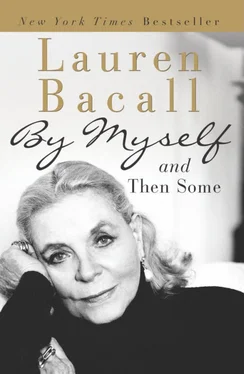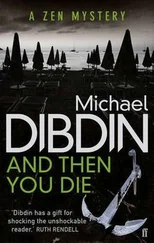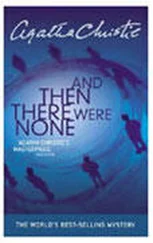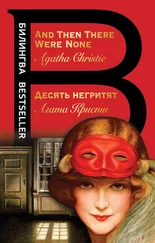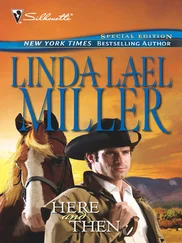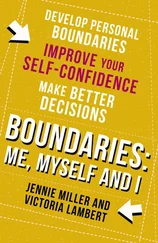The Stage Door Canteen was about to open in New York and it needed hostesses. Only theatre folk qualified. I signed up for Monday nights. I was to dance with any soldier, sailor, or marine who asked me – get drinks or coffee for them, listen to their stories. Many of them had girls at home – were homesick – would transfer their affections to one of us out of loneliness and need. Some would come every Monday night to see the same girl. It was really very sweet and sad and fun, a natural set-up for a dreamer. There was always music, and stars would appear each night to entertain or talk to the boys from the small stage. My first night there I couldn’t believe it – Alfred Lunt and Lynn Fontanne were washing dishes and serving coffee. Helen Hayes too. Betty Kalb and I had signed up together. Each of us was so busy watching the famous stars coming in that there wasn’t time for us to compare notes until the end of the evening. On Monday nights there was fierce jitterbugging. Many a time I found myself in the middle of a circle – everyone clapping to the music – while I was being whirled and twirled by one guy, then passed on to another, nonstop, until I thought I would drop. Judy Garland and Johnny Mercer came in one night and sang some of Mercer’s songs – John Carradine came in – and many, many others. It wasn’t much to do for the war effort, but it was something. At least the boys had a place to go that was clean and fun and a relaxing change for them.
I overdramatized every situation for myself. A young sailor took a fancy to me – I think I reminded him of his girl. He came in every Monday night for weeks, then one night he told me he was going to sea – didn’t know where, of course. He was charming and very homesick. He asked if he could write to me. ‘Certainly,’ I said, ‘I’ll let you know what’s going on back here.’ I didn’t know what to say to him – war was a fiction to me, not a reality. I didn’t really understand what it meant – how could I?
I continued to pound pavements – make the rounds. They were casting a show called Johnny 2 × 4 by a man called Rowland Brown. He was producing it himself and it was to be staged by his brother, Anthony Brown. It called for a large cast, I was told, so I headed for the Brown office. I met both brothers – it was a small office filled with actors, and the Browns were accessible. Rowland Brown told me the speaking parts were already cast, but there were to be many walk-ons. The setting was a speakeasy and they wanted atmosphere. Would I leave my name and address and they would call me. That again! I had left my name in so many offices it had become routine. I still hoped and still prayed with the same fervor, but nothing had ever happened. The next Monday, I was called and asked if I’d come to the Brown office. I couldn’t believe it. I got myself together and marched over to 44th Street. Rowland Brown told me there was an opening for me as a walk-on. The salary was only fifteen dollars per week – I would have to join Equity – it was not a speaking part, but it was on a stage! On Broadway! I was beside myself. In as controlled a voice as possible, I said I would love to be in his play Mr Brown said he would make the arrangements with Equity, call me when the contracts were ready, and get all the information to me about rehearsals, wardrobe, etc. The play was not going out of town, but would rehearse for three weeks, play a few previews, and open in New York.
I was on a cloud. At last I would be a professional actress – a full-fledged member of that hallowed union, Actors’ Equity. It wasn’t a real part, but it was a beginning. Perhaps the tide was beginning to turn – my luck beginning to change. I had no idea what I would need in the way of clothing for the show – make-up – what I would actually have to do. How would I be able to wait for that call to sign my name on the piece of paper – how would I wait for that first day of rehearsal? Mother was thrilled because I was thrilled. It was a beginning, a breakthrough. There is no high on earth like the high of realizing even part of one’s dream. I was in a daze. Couldn’t wait to get to the Canteen that night to tell Betty Kalb. What did I care that the salary was fifteen dollars a week? It was Broadway, and I’d be behind the footlights – other girls would be leading people to their seats, and they’d be coming to see me for a change. Did I have a shock coming! Betty was as happy as I was, and I told everyone else who would listen. I was bursting that night. It was my first feeling of complete happiness. At that moment I had everything I wanted.
A few days later I went to the Brown office to sign my contract. By this time I had added another l to my last name. There was too much irregularity of pronunciation – ‘Backle’ some would say, ‘Bacahl’ others – with the added l, that last syllable was clearly to be pronounced one way and one way only – call (cawl). It was a standard Equity contract – standard for walk-ons, that is. The entry fee for Equity was $50. Rehearsals were to start in a week. I was to provide my own clothes and when we were into rehearsals a bit I’d know what I needed. So one day in February 1942 I went to the stage door of the Longacre Theatre to start my professional acting career. I walked to the wings, where the stage manager was waiting to check us all in. There were so many people – apart from the leads, there were about ten small parts and another ten walk-ons. The whole experience was magical. Chairs were placed onstage – a few tables an upright piano. I knew no one, but I was still in seventh heaven.
Rehearsals began – those of us who had no parts sat in the back of the theatre. Those of the cast who had musical numbers had already rehearsed them and went through them roughly that first day. I thought it was a marvelous play, I loved everything about it – I had no judgment. Johnny, played by Jack Arthur, owned a speakeasy – Monica Lewis sang there. Barry Sullivan was the hero, Evelyn Wyckoff the heroine. Harry Bellaver had a large part – Jack Lambert was the heavy – there were bodyguards, B-girls, guests (I was one of the latter). In the first act I was onstage with a group of others sitting at a table. As rehearsals progressed I was given more to do. In the second act I made an entrance down the stairs center stage chatting with two men – no audible dialogue, need I say? – and sat at a table downstage with a couple of the B-girls. One of them was a girl named Carolyn Cromwell, who became my friend at once and has remained so all of my life. In the third act I was to be doing the jitterbug as the curtain rose, and when the music ended, my partner and I were to sit at a table stage right. I felt I had been singled out. I wasn’t merely a walk-on, I had something special to do in each act – I was an ‘outstanding’ walk-on (my name for it – no one else’s).
The show was full of music, laughter, melodrama – the smoke of a speakeasy – the Yacht Club Boys singing songs onstage and moving through the audience – love – shooting. It had everything. We opened on March 16, 1942. I was as nervous as though I had had a large part – or even a small one. When the curtain went up on the third act my partner and I were dancing and I was shaking from head to toe. To see all those faces out front, what an extraordinary feeling. I was terrified and I didn’t even have to open my mouth. But still the incredible excitement backstage – in the dressing rooms – each actor, each walk-on making sure he had what he needed for the performance. The fact that one doesn’t speak doesn’t make it less of a performance – at least, in my eyes it didn’t. I was there for a purpose, I had a specific function to perform – it might not be noticed individually, but it was part of the whole. In my inexperience and fright, I felt that all eyes were on me when I was onstage, but it wasn’t ego or conceit, it was anxiety, nerves, and built-in self-consciousness and insecurity. My mother, Charlie, and Rosalie came to the opening night; the rest of my relatives staggered their visits, Jack and Vera bringing Grandma to watch her favorite granddaughter’s debut. On opening night I remember standing in the wings watching Barry Sullivan and Evelyn Wyckoff waiting to go on, and I knew at that moment that I was right, that being an actress was the best possible choice in life.
Читать дальше
